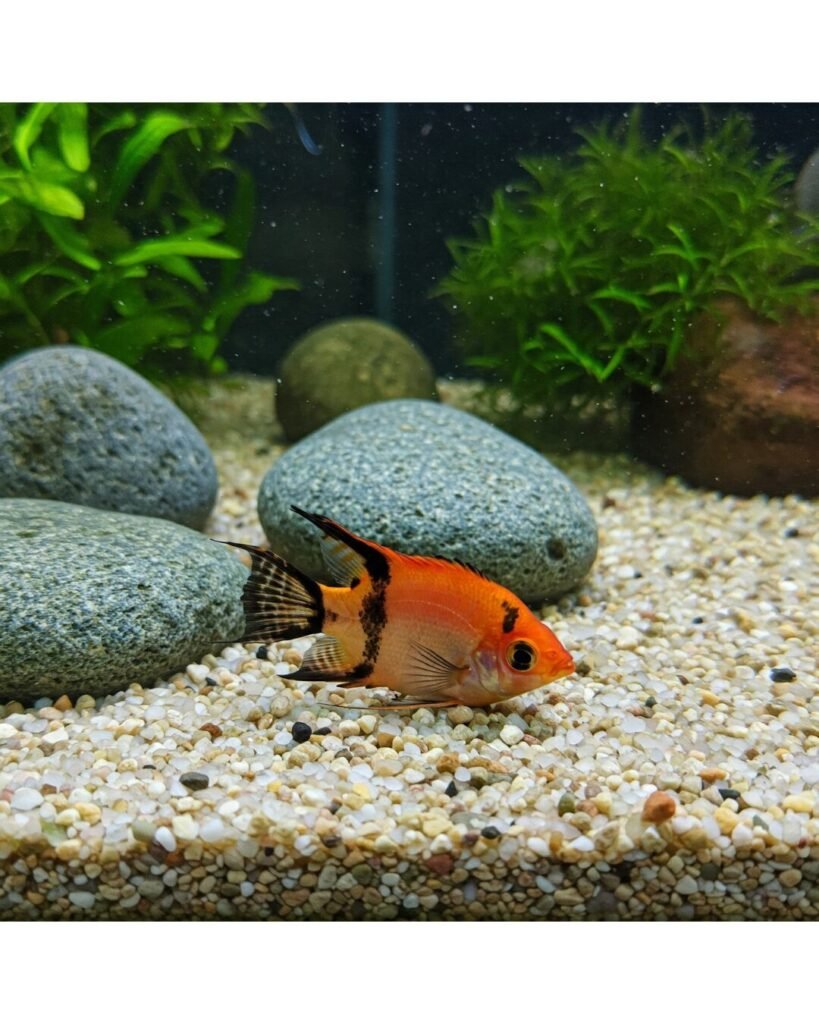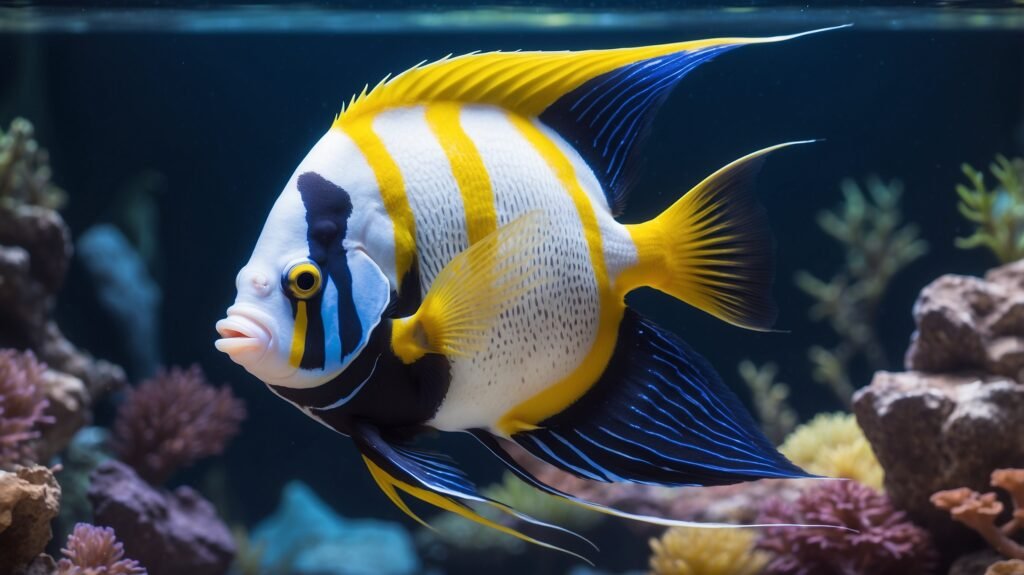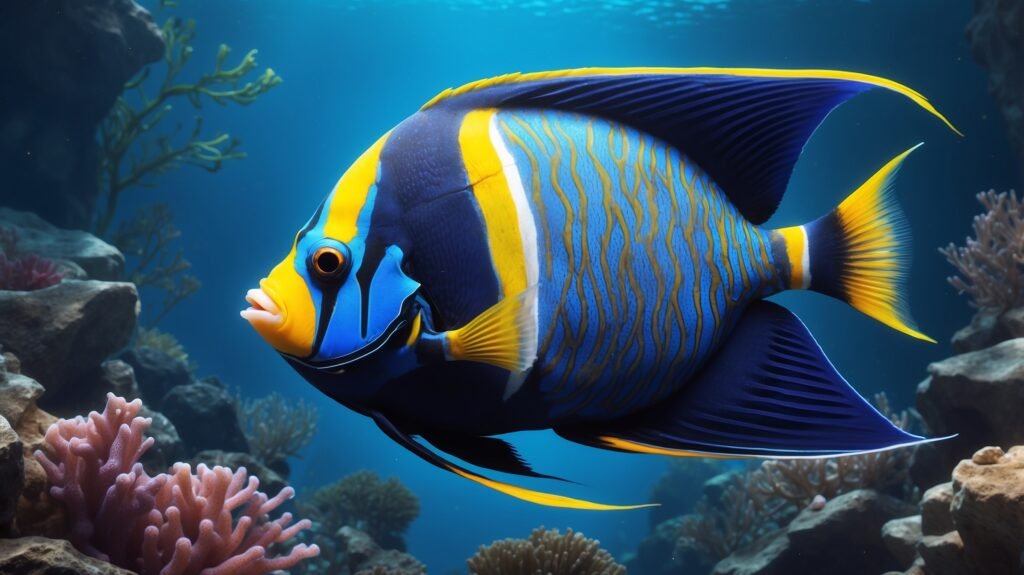Introduction
Angelfish stands as one of the foremost commonly kept freshwater aquarium fish because of their graceful body along with their charming nature. The majority of aquarists express curiosity regarding whether angelfish requires sleep. Angelfish have their own distinctive method of resting that customers may struggle to detect if they are unskilled observers. Your aquarium requires proper angelfish sleep understanding because it determines their health and establishes a relaxed water environment.
This detailed exploration: “How Do Angelfish Sleep? Angelfish Sleeping Guide” discusses angelfish rest patterns together with their resting methods as well as their perfect resting zone and several widespread false notions about their sleep behavior.

Key Takeaways
- The slumber patterns of angelfish differ from the rest periods of human beings and mammalian species.
- Their bodies remain motionless when they rest throughout the night as they float throughout the water.
- Angelfish experience sleep with visible eyes since their body does not contain eyelids.
- The resting process lowers their metabolic operations to preserve energy.
- Angelfish cannot experience REM sleep and consequently, they do not experience dreaming behavior.
- Perpetual angelfish health depends on an appropriate sleeping environment that uses dim light along with stable water conditions and hiding spots.
Do Angelfish Sleep?
Yes! Angelfish require rest periods but their rest differs from conventional sleep patterns known to human beings. The fish’s body becomes paralyzed during this time while the metabolism rate slows down yet their awareness of their environment remains active. Observing your angelfish staying motionless in one position during night hours usually indicates they are resting. The necessary duration of rest promotes the health and wellness of angelfish although their sleep state differs from that of mammals .The absence of proper resting time causes angelfish to experience stress that results in weakened immune function and unpredictable behaviors among fish.
Do Fish Sleep Like Humans?
The sleep patterns of angelfish along with other fish species differ completely from human patterns of slumber. Human beings alternate between multiple sleep stages which include REM sleep when dreaming happens but fish rest in a state that does not reach deep unconsciousness.
Key Differences Between Human Sleep and Angelfish Sleep
| Feature | Humans | Angelfish |
|---|---|---|
| Eyelids | Closed while sleeping | No eyelids, eyes remain open |
| Brain Activity | Deep REM sleep with dreams | Light resting state, no REM sleep |
| Posture | Lying down in bed | Floating in place |
| Metabolism | Partially active | Slows down significantly |
The sleep-like period of angelfish remains essential for their survival as well as for their general health despite their different approach to rest.
How Do Fish Sleep or Take Rest?
Fish species differ in their sleeping behaviors. Sand-burrowing fish are distinct from those who rest by plants and those who seek shelter in crevices.
The rest period for asleep angelfish includes:
- The fish remains passive and still inside a protected zone.
- Their bodies assume positions that lower slightly at times and they choose to remain near the bottom of the tank.
- Reducing responsiveness to outside movements.
- They reduce the pace of their respiration as well as their metabolic functions.
Because angelfish function as prey species in their natural environment they never achieve complete unconsciousness. They stay in a state of semi-awareness to watch for dangers and alterations in the environment.
Do Betta Fish Sleep? Betta Fish Sleep Guide
Angelfish Sleeping Habits
Angelfish Usually Sleep at Night:
- Angelfish behave as diurnal animals because they perform their activities throughout daytime hours before resting at nighttime. When the aquarium lights decrease angelfish initiate their sleeping period.
- When light returns during their resting time they will require several seconds to completely recover their normal behavior. A regular schedule between day and night serves as the essential factor for controlling their sleep patterns.
Angelfish Sleep with Their Eyes Open:
- When angelfish sleep, their unprotected eyes remain open. It becomes challenging to recognize the timing of their sleep state. The absence of body activity functions as an important sign that fish are asleep.
- Conceptual and physical rest occurs in angelfish when their brain operation decreases although their eyeballs remain visible.
Angelfish Slow Down Their Metabolism:
- The metabolic operations together with breathing activities of an angelfish significantly decelerate when it sleeps. The reduced energetic activity allows fish to save energy while healing from regular activities.
- During rest your angelfish will show a reduced breathing rate when measured against their active breaths per minute.
Angelfish Do Not Dream:
- The absence of REM sleep prevents angelfish from experiencing dreams since humans alone experience this form of rest. These animals sleep only to rest their bodies because their minds never require processing during these periods.

How to Tell an Angelfish Is Sleeping
Not Moving, But Not Belly-Up:
- During sleep time an angelfish will stay motionless without moving from its upright position. Angelfish floating upside down with unbalanced movements might signify illness because sleep should not result in these problems.
Change in Color:
- During rest periods some types of angelfish experience slight color modifications in their bodies. The decreased metabolic state causes their bodies to become paler and dull in appearance.
Betta Fish Turning White
Resting on the Bottom of the Tank:
- In their rare moments of slumber, angelfish occasionally rest by the bottom edge of the tank. The behavior is acceptable if the fish keeps a relaxed position with its body upright. Check for signs of both illness and stress because a lethargic angelfish behavior might point toward either condition.
Not Attracting Other Fish:
- When resting an angelfish becomes unreactive to what surrounds its environment. Other fish may swim in its vicinity yet the angelfish stays unengaged until there is sudden startlement.
Can Betta Fish Live with Other Fish?
Common Misconceptions
Misconception #1: Angelfish Do Not Sleep
People commonly believe that fish do not require sleep because they never show their eyes being shut. Social media misinformation suggests angelfish do not sleep yet this is incorrect because they experience rest periods differently than humans do.
Misconception #2: A Still Angelfish Is Sick
An angelfish that remains still at night is usually just resting peacefully. Check for health problems if your fish remains inactive in daylight apart from showing additional symptoms including appetite loss or air gulping.
Angelfish Ideal Sleeping Environment
Angelfish benefit from a proper sleep environment according to the following rules:
- A proper light schedule for angelfish consists of giving them 10-12 hours of light followed by 12-14 hours of dark periods each day.
- A gradual illumination system should help your angelfish experience natural light cycles of dawn and dusk.
- The aquarium should feature hiding areas made from both plants like Java Fern and decorations as well as caves. Marimo Moss Ball In Betta Fish Tank
- A stable water environment must remain clean with normalized oxygen levels.
- Reduce all nighttime disturbances because they cause stress.
Sleep Disorders in Angelfish
Angelfish display the same sleep patterns as other species of animals do.
Common Sleep Issues:
- The behavior of aggressive tank mates often disrupts sufficient rest by causing stress to the angelfish.
- The condition of tank water negatively affects the sleep patterns of fish.
- The exposure of excessive light causes disturbances to their native sleep pattern.
- Noise or sudden movements that occur near the tank tend to wake them jolted from their rest.
Inspect the angelfish environment for possible stress factors in case it shows restlessness or sleep issues.

Angelfish Care Guide for Fish Tank
The following steps will ensure your angelfish thrives in health along with happiness:
- The tank needs regular cleaning and proper filtration systems need to be installed.
- Keep the water temperature between 76-82°F (24-28°C).
- Angelfish requires a balanced diet that includes high-quality flakes, and pellets alongside occasional live food. How Long Can Betta Fish Go Without Food?
- Every angelfish needs at least 20 gallons of space when living as a single fish. How Many Betta Fish In A 5-Gallon Tank?
- Regular monitoring of tank conditions will help stop stress-related health problems from occurring.
Conclusion
So, do angelfish sleep? Absolutely! The fish do not sleep humanly but they enter a restful state during which their movement decreases while their metabolic rate slows down for recovery after active periods. An appropriate sleep environment enables your angelfish to remain healthy as well as stress-free in the aquarium.
Frequently Asked Questions
Do Angelfish Sleep Upside Down?
No, angelfish do not typically sleep upside down. This could be a sign of illness. Healthy angelfish usually sleep in a more upright position.
Do Angelfish Sleep On Their Sides?
Occasionally, an angelfish might rest on its side. This can sometimes be normal, especially if they find a comfortable spot amongst plants or decorations. However, if your angelfish is consistently sleeping on its side, it could indicate a health issue. It’s best to observe them closely for other symptoms.
When Do Angelfish Sleep?
Angelfish sleep primarily at night when the aquarium lights are off. They are diurnal, meaning they are active during the day and rest at night.
Where Do Angelfish Sleep?
Angelfish prefer to sleep in a calm, dimly lit area of the tank. They often choose spots among plants, near decorations, or in open water, typically closer to the surface or mid-level. Each fish may have its own preferred sleeping spot.
How Long Do Angelfish Sleep For?
Angelfish don’t have long, continuous sleep periods like humans. They take short naps throughout the night and sometimes during the day. It’s more accurate to say they have periods of rest and inactivity rather than long “sleeps.”
Why Do Angelfish Sleep a Lot?
Increased resting or inactivity can be a sign of stress or illness. If your angelfish seems to be sleeping excessively during the day, check the water parameters, temperature, and for any signs of disease.
How to Stop Increased Sleeping In Angelfish?
You can’t necessarily “stop” increased sleeping, as it’s often a symptom. Instead, address the underlying cause. Test your water for ammonia, nitrite, and nitrate levels. Ensure the temperature is appropriate. Observe your fish for other signs of illness like fin rot, ich, or clamped fins. If you suspect a problem, consult with an experienced aquarist or a veterinarian specializing in fish.
Do Angelfish Take Naps?
Yes, angelfish do take short naps throughout the day, even with the lights on. These are usually brief periods of rest.
Do Angelfish Need Darkness To Sleep?
While they don’t necessarily need complete darkness, a period of darkness is beneficial for their natural sleep cycle. Simulating a day/night cycle with aquarium lighting is important for their well-being.
How To Tell If an Angelfish Is Sleeping or Dead?
A sleeping angelfish will usually have its fins slightly relaxed and may drift gently in the water. A dead fish will often be still, may be lying on its side or upside down, and won’t respond to gentle prodding. If you’re unsure, observe the fish closely for any signs of breathing (gill movement).
Do Angelfish Sleep Upside Down?
Again, no. Sleeping upside down is not normal for angelfish and is often a sign of illness.
Do Angelfish Sleep With Their Eyes Open?
Yes, like most fish, angelfish do sleep with their eyes open. They don’t have eyelids.
Are Angelfish Nocturnal?
No, angelfish are diurnal, meaning they are most active during the day and rest at night.
Do angelfish sleep?
Yes, angelfish do sleep but in a different way than humans. They enter a state of rest rather than complete unconsciousness.
How can I tell if my angelfish is sleeping?
Look for signs like reduced movement, pale coloration, or resting at the bottom of the tank.
What is the ideal sleeping environment for angelfish?
An ideal sleeping environment includes hiding spots, stable calm water, and dim lighting at night.
Do freshwater angelfish sleep differently from saltwater fish?
Yes, all fish species have unique sleeping patterns, but the general concept of resting applies to different types.
Can angelfish suffer from sleep disorders?
Yes, factors such as stress and poor tank conditions can disrupt their sleeping patterns. Regular monitoring of their environment is key to preventing sleep issues.
Can angelfish sleep with the lights on?
No, they need a dark environment to regulate their sleep cycle properly.
Why does my angelfish look pale when sleeping?
A slight color change is normal as their metabolism slows down.
Do angelfish need hiding spots to sleep?
While not necessary, they feel safer with plants and decorations for shelter.
Why is my angelfish not moving?
If it’s nighttime, they might be sleeping. However, if lethargy continues, check for illness.
How can I improve my angelfish’s sleep?
Maintain a stable light cycle, provide hiding spots, and minimize disturbances at night.
People Also Read:
Can Betta Eat Tropical Fish Food?
Clamped Fins In Betta Fish
Fin Curling In Betta Fish
Platinum Betta Fish
Marine Betta Fish: Comet Betta
Betta Fish Saltwater or Freshwater Fish?
Betta Fish Glass Surfing: Betta Fish Chasing Reflection
Koi Galaxy Betta Fish: Galaxy Koi Betta For Fish Tank
TDS For Betta Fish
How to Play With Your Betta Fish?
Do Betta Fish Like Ping Pong Balls?

